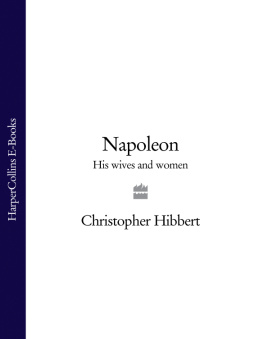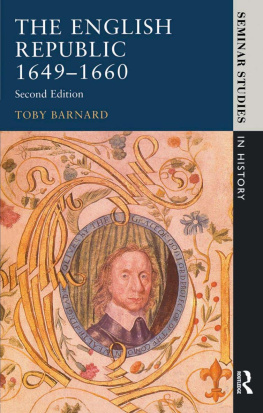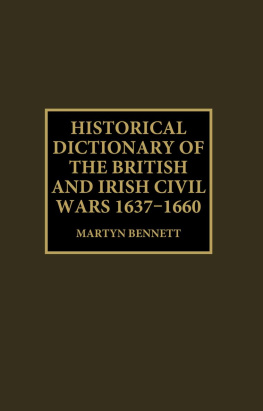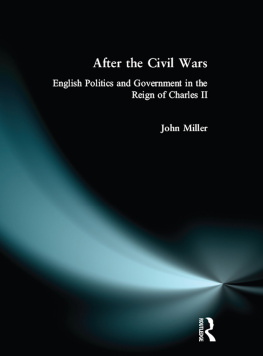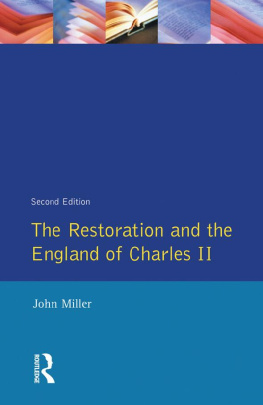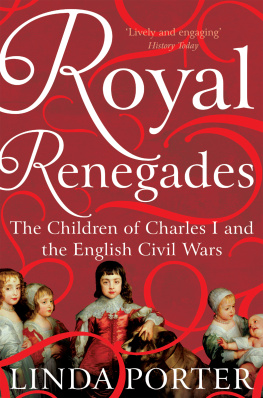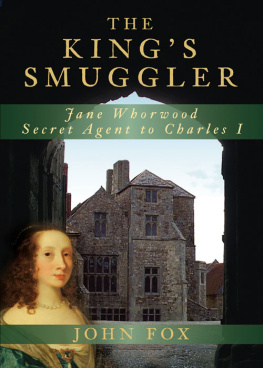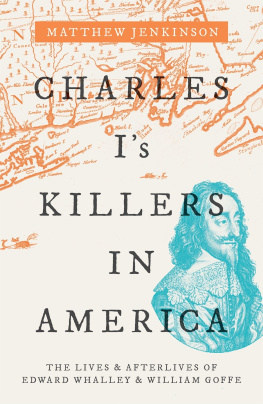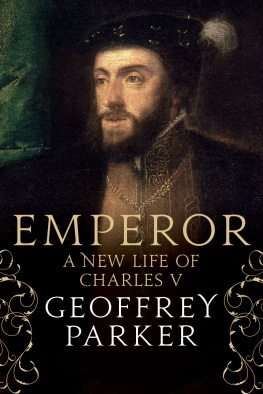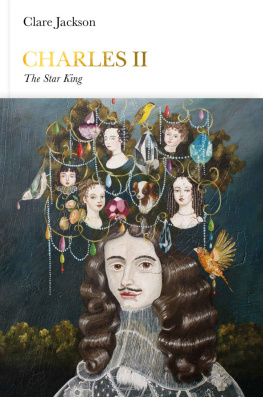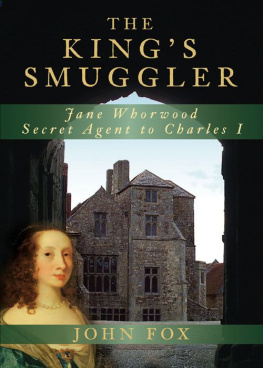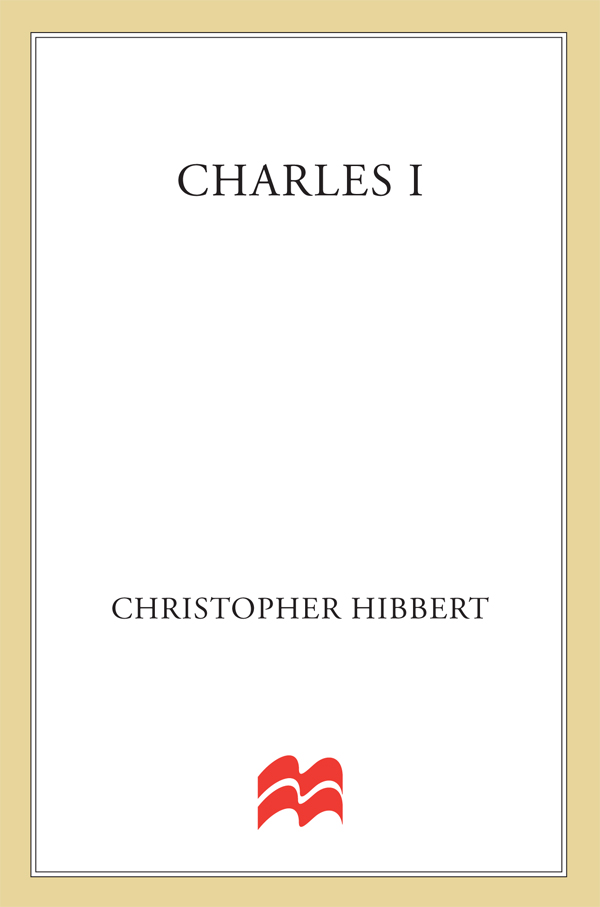Contents
Guide

The author and publisher have provided this e-book to you for your personal use only. You may not make this e-book publicly available in any way. Copyright infringement is against the law. If you believe the copy of this e-book you are reading infringes on the authors copyright, please notify the publisher at: us.macmillanusa.com/piracy.
For Rupert and Ann
I am most grateful to Dr Maurice Ashley for having read the manuscript and for having given me much useful advice, and to my wife for having read the proofs and prepared the detailed index.
C.H .
Christopher Hibbert is a paradox. He is an apparently modest man who has had the courage to go against the dominant cultural currents of his timeor, at least, to stand aside from them. He is also an affable, gentlemanly bon viveur, who suffers from the supremely gentlemanly affliction of gout but who, nevertheless, has had the steel and industry needed to become the most prolific and popular British historian of the second half of the twentieth century, with over forty books, most of them best-sellers, to his name. The key to his success lies, unsurprisingly, in his self-knowledge: of his weaknesses as well his far greater strengths.
Hibbert was born in 1924 and educated at Radley, one of Englands notable Public (that is, England being England, private) Schools and the University of Oxford. But his studies were interrupted by the Second World War, in which he served with gallantry, being awarded the coveted Military Cross. After the War, he returned to Oxford to complete his degree in History, which he did without much distinction, and then filled in time as an Estate Agent (Realtor) before he discovered his vocation as a writer.
His first, unpublished book was a novel. And that really says everything. For what Hibbert brings to the writing of history are the skills of a novelist: he is a master story-teller, a dab-hand at depicting character and, above all, a stylist of elegant, effortless skill. The result, as one might expect from a gentleman and a bon viveur, is history which is to be read for pleasure and entertainmentfor sophisticated, cultured entertainment, but for entertainment nonetheless. This is why Hibbert has sold books by the shed-load and why he continued to sell even in the Eighties and Nineties of the last century, when the art of Popular History seemed to be dying.
As it happens, the reports of the death of Popular History proved to be much exaggerated. But its decline, on which Hibbert himself has spoken perceptively, was real enough. It resulted, above all, from a strange bifurcation in the business of writing history. Before the Twentieth Century, great historians were, more or less axiomatically, great writers also: Edward Gibbon and David Hume in the Eighteenth century and Thomas Babington Macaulay in the Nineteenth made, to differing degrees, notable discoveries and framed challenging arguments. But they did so, to a man, in splendid prose. That is why they were read by contemporaries and why they have continued to be read by posterity.
But the beginning of the Twentieth Century saw the appearance of the new phenomenon of the Professional Historian. He held a university professorship, of which he was inordinately proud, and spent his life burrowing in archives. He devoted more time to his footnotes than his prose. Indeed, with a few notable exceptions, he regarded good writing as a sign of deplorable levity and unseriousness. He despised narrative and thought biography a frivolous diversion from the historians proper business of analysing Great Forceslike Labour, Capital and Ideas. Above all, he was supremely contemptuous of any non-Professional Historian who dared to write history. He was also, incidentally, desperately jealous of the amount of money such cheaply-readable writers often made.
And Hibbert, in the age of the Professional Historian, was the supreme odd-man-out. While paying proper, even exaggerated respect to the superior intelligence of the academic historian, he continued to write history in the old, elegant way with scarcely a nod to the new values and approaches of the professionals. As his Charles I shows. Written in 1968, at the peak of his powers, its deceptively simply narrative masks real artistry, in which the form of the biography is made to reflect the essential character of the subject.
For Charles, as Hibbert demonstrates, was a man profoundly unhappy with, as well as unskilled at, the messy nitty-gritty of politics. Instead, he loved the pure air of aesthetic experience: whether performing in the Court masques of which he was the star; contemplating the masterpieces which studded his great collection of paintings; or practicing the beauty of holiness in his religious devotions. Understanding this intuitively as well as intellectually, Hibbert writes Charless biography almost as though it were the libretto of a grand opera. The detail of events, which Charles despised and so often failed to grasp, is swept aside to focus on a series of great set-piece tableaux. And best, as befits a biography in which a disastrous life was redeemed by a noble death, are the death-scenes: the extraordinary self-immolation of Queen Elizabeth I; the squalid, disease-ridden end of Charless father, King James I, and, at the climax of the book, Charless own execution, in which, thanks to his sense of theatre, he the victim was able to seize control and turn his beheading into a Christ-like martyrdom.
You wont, in short, find much by way of the causes of the English Civil War in this book. But you will understand the man who, with his strengths and still stronger weaknesses, did most to bring it about. You will also read with pleasure and, when you have finished, you will long to read more of Hibberts books.
David Starkey
London
February 2007
The Child and His Parents
160016
I N her great bedchamber at Richmond Palace, between two and three oclock in the morning of 24 March 1603, Queen Elizabeth turned her white and wrinkled face to the wall, and died. Three hours later, soon after it was light, Sir Robert Carey, a grandson of her aunt, Mary Boleyn, stole out of the palace grounds and galloped off towards the Great North Road.
Carey was a man of great strength and stamina. Some years before, he had won a wager of two thousand pounds by walking from Plymouth to Berwick-upon-Tweed in twelve days, an average of thirty-nine miles a day. His feat this March was scarcely less remarkable. On the evening of the 26 March, having ridden 397 miles in less than sixty hours, he brought his last panting relay horse into the courtyard of Holyrood Palace in Edinburgh and, spattered with mud, be-blooded with great falls and bruises, he dropped wearily from his saddle. He was the first as he had been determined to be in the hope of reward to bring the long-awaited news to James VI , King of Scotland, that he was King now, too, of England.
* * *
Within a week King James had formally bidden farewell to the Scottish people and soon, accompanied by numerous courtiers and retainers who hoped to share with him some of the profits of his new inheritance, he was riding for the border. The farther south he reached the more his welcome excited him. The people of all sorts rode and ran, nay, rather flew to meet him, he afterwards remembered with characteristic self-congratulation, their eyes flaming nothing but sparkles of affection, their mouths and tongues uttering nothing but sounds of joy.


